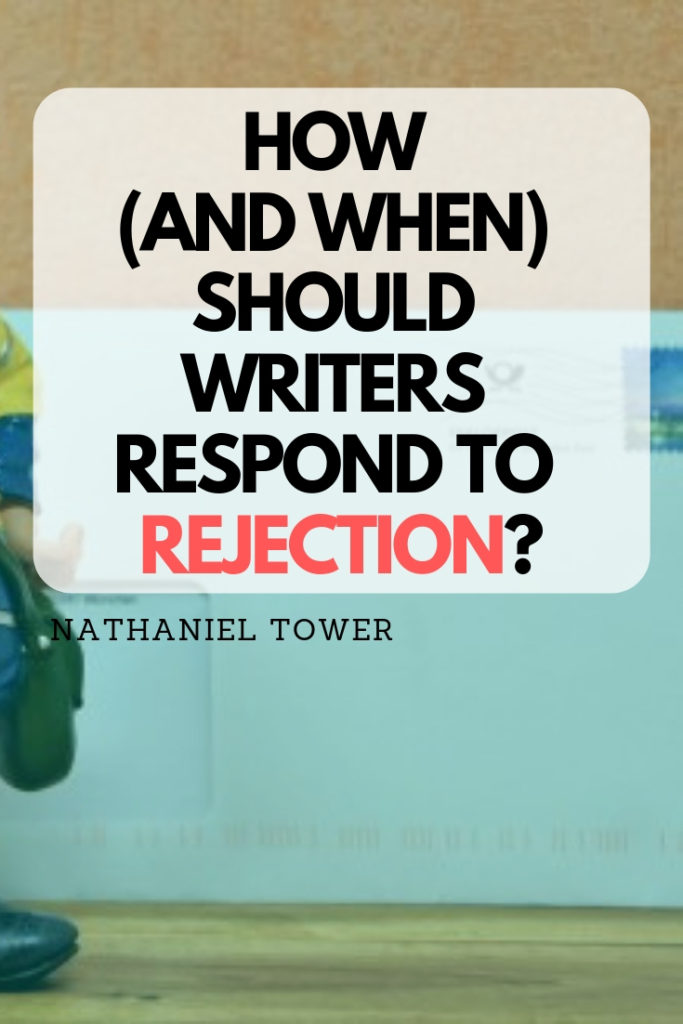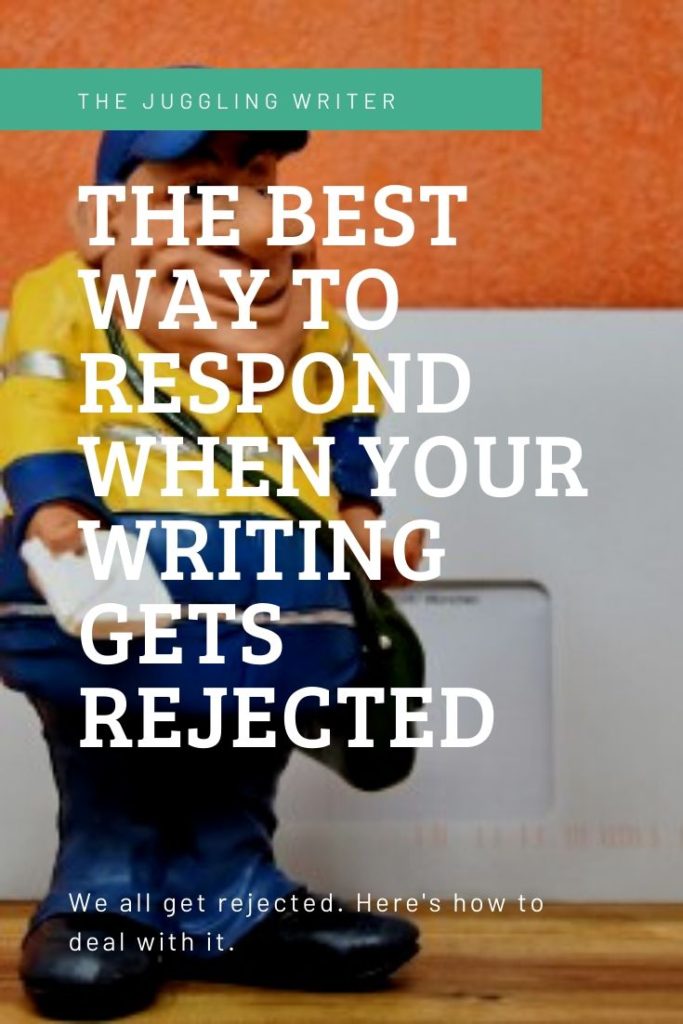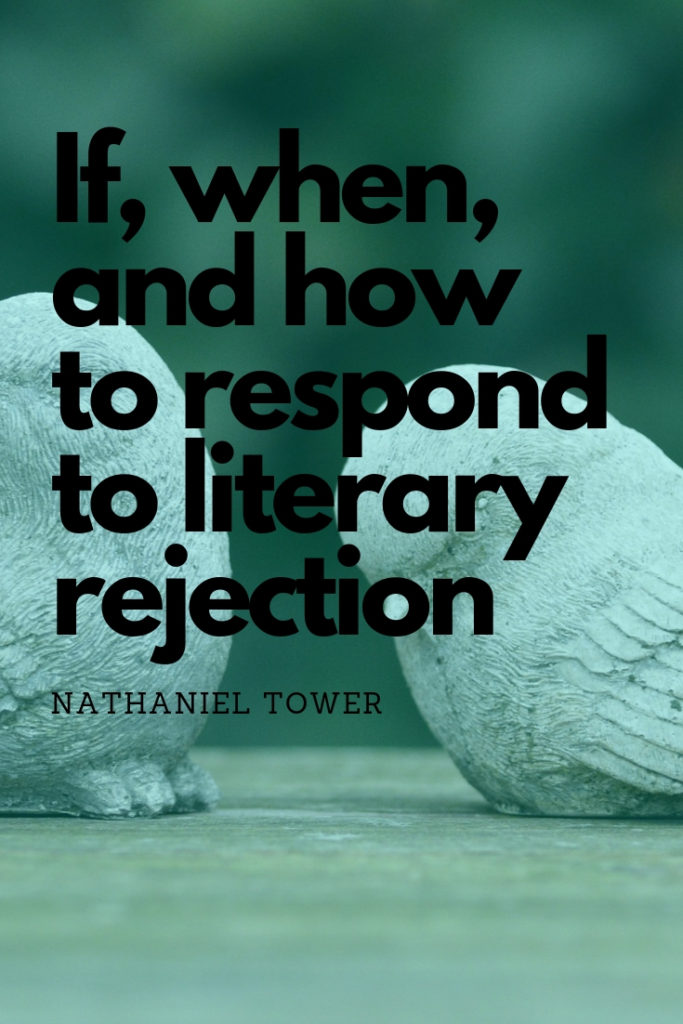Last Updated on October 14, 2022 by Nathaniel Tower
Nothing elicits more fear and excitement for a writer than seeing a new email from an editor sitting in their inbox. These emails can bring us great news, bad news, or even something in between. Will it be a rejection? An acceptance? A restraining order requesting you never submit again? Just seeing the unread email there can be enough to cause a panic attack.
When you get a response from an editor of a publication you submitted to, it’s usually one of the following:
- An acceptance. The editor is letting you know that your work has been accepted for publication.
- A rejection. The editor is regretfully informing you that your work did not make the cut.
- A rewrite request. The editor says it’s good but not quite ready.
- A status update. The editor is politely telling you that they are still holding onto your story for consideration.
After reading the email and either celebrating, cursing, or sighing, you need to decide how to respond. Of course, not all correspondences from editors need a response. Here’s your guide to if, when, and how to respond.
Responding to an acceptance
If you get an acceptance, you definitely will need to respond. Your response should include the following:
- A brief and sincere thank you for the opportunity.
- Any requested information, including a bio, headshot, address for payment or contributor copies, signed contract, etc. Make sure you take this part seriously and follow through exactly as the acceptance prescribes.
You should reply to an acceptance as quickly as possible. If you can, respond within the same day. If you need some time to gather any information or look over a contract, that’s certainly fine. If it will be more than a couple days before you can get everything over to them, send them a polite response letting them know.
You should never respond to an acceptance by doing any of the following:
- Sending a revised version of the story and telling them to use this one instead. They accepted the story you sent, not the one you’ve been working on since then.
- Requesting a payment that’s above what their listed guidelines indicate. If you knew what they were paying (or not paying) when you submitted, then you agreed to these terms already by submitting. There certainly are some circumstances where an acceptance is a time to negotiate, but not when the publication clearly says they pay 5 cents per word or that they don’t pay their authors.
- Refusing the acceptance because the piece was already accepted elsewhere. If the piece was accepted elsewhere, you should have withdrawn it immediately. In the rare case that you receive two acceptances at the same time, then you’ll need to figure out a tactful way to explain this to the editor you are choosing to turn down. Better yet, make sure you understand what simultaneous submissions are before you even submit your work.
Other than that, responding to an acceptance is pretty simple. This is the moment you’ve been waiting for! Take that acceptance with pride.
Responding to a rejection
In most cases, there’s no need to respond to a rejection. This is especially true if you’ve received a form rejection. A form rejection means the editor has given you no personal feedback at all. Some writers mistake phrases like “this one was close” or “we really enjoyed your submission” as a personal rejection. A personal rejection means the editor is saying something specific about your submission and why it wasn’t accepted. “This was close” is not specific. It indicates nothing about your submission. It’s quite possible that they include this “encouragement” in every rejection to soften the blow.
You might think it’s polite to respond to any rejection with a “thank you for your time” email. This is completely unnecessary. You’ve presumably already thanked them for their time in your cover letter. Sending a follow-up email that thanks them for their time just adds more to their already cluttered inbox. As with just about anything though, there are some exceptions.
When to respond to a rejection
Keep in mind that it’s never required to respond to a rejection. If the editor has given you personal feedback, it’s not out of line to send a brief thank-you note. If you do respond, keep your email short out of respect for the editor’s time. There’s no need to say anything beyond something like this:
“Thank you for reading my work and providing this detailed feedback. I appreciate your encouragement and advice, and I will use this in future revisions.”
That’s it. Nothing more. And remember, you don’t have to write this. You don’t have to respond to rejections at all.
How NOT to respond to rejections
As stated above, the only response to a rejection should be brief and polite. Anything else is just going to burn bridges. Here are some examples of how you should NEVER respond to rejections:
- Telling the editor he/she was wrong. Of course you think the editor was wrong. Otherwise, you never would have sent your piece in the first place. Here’s a hint for you: the editor was right. They had their reasons for rejecting your work, and nothing you say can change their mind. But things you say can guarantee they’ll never accept your work in the future.
- Asking if you can revise and submit again. If they wanted you to revise and submit again, they would have told you that.
- Replying with another story attached. Never follow up a rejection with another submission unless they specifically ask for one. Many publications have a mandatory waiting period before you can submit again. Don’t be the annoying writer who keeps sending story after story after story. Rejection is time to reflect and figure out what you can do differently to get an acceptance.
- Waiting until your story is accepted elsewhere and then sending them an email to let them know the piece they rejected is being published by so-and-so. That’s fantastic that you got an acceptance. No need to be a condescending asshole. Brag about your acceptance on Twitter and Facebook instead.
As managing editor of Bartleby Snopes, I received plenty of replies to rejection. Most of them were appreciative and polite. While none of those emails were necessary, I must admit they sometimes made me feel good. None of them ever impacted whether or not that writer had a subsequent acceptance. One out of every fifteen or so was an email telling me why I was wrong (and usually not anywhere near that polite). Interestingly enough, we never published any of those authors.
The only other time you might consider responding to a rejection is if the editor clearly made a mistake. Maybe the email was addressed to the wrong person or they provided feedback that obviously wasn’t related to your submission. In these cases, just politely let them know that you think they made a mistake and briefly explain the situation. Pretty simple.
My general philosophy to responding to rejection: don’t do it. It’s just not necessary and can lead to more harm than good.
Responding to a rewrite request
If an editor asks you to rewrite a submission, you should immediately respond by thanking them for the opportunity. Let them know you would like to take them up on the offer and give an estimate for when you’ll send in the revision. In most cases, they will provide some feedback to help shape your rewrite. If they ask you for a rewrite but don’t provide any feedback, you probably don’t want to waste your time rewriting your submission and sending it to them again. You need to know what they’re looking for here. Without feedback, you’re better off sending that piece somewhere else.
Responding to a status update
In most cases, you don’t need to respond to a status update. If they’re just letting you know that your story made it past the first round, then there’s nothing you need to say. However, there are cases where responding to a status update is necessary, and they will usually be obvious. For example, the editor may say they need another month or two to make a decision and that they want to know if that’s okay with you. This usually happens when the timeline takes longer than they expected. If this happens, just respond appropriately. If you’re willing to wait, let them know. If you don’t want to wait for some reason, then tell them you’d like to withdraw your piece from consideration.
How to respond after your story has been published
Most editors reach out to you again when your story or poem is published. This is a courtesy that lets you know your piece is live so you can see it and start promoting it. I would definitely recommend responding to this email. Again, keep your email short and polite. Something like this:
“Thank you again for accepting my work. Everything looks great, and I’m excited to start sharing it.”
Pretty easy, right? Just don’t do any of these things when you respond to the just-published email:
-
- Respond with a bunch of edits. If there’s a typo, that’s one thing. But after it’s been published is not the time to make changes.
- Send them more of your work. They just published you. Give them a break.
- Ask for a detailed plan of how they are going to promote your work.
- Demand any payment that’s coming to you immediately. If this was a paid acceptance, you’ll get your money soon enough. That’s what the contract was for. Don’t be a jerk. Just be grateful it was published and be patient.
There you have it. Everything you need to know about if, when, and how to respond to editors. Now go send out your work and get some acceptances!
How do you respond to emails from editors? Share your tips and stories in the comments. And don’t forget to share this post on all your favorite channels.




i was jumping in the street from the happiness…i did not believe it…we talk either via email either on phone….now waiting for publishing
Thanks for the great information, Nathaniel. I’ll be sharing this!
Thanks for the comment and the share!
I always respond to each editor with a lengthy missive about his lack of manhood, who his wife is really sleeping with, who his kids really look like, why his pets don’t like him, whether the milk in the fridge is really expired and a killer meatloaf recipe. I usually get a thank you note for the meatloaf recipe attached to something called a “Cease and Desist” order. Two more and I’ll have enough to wallpaper my bathroom.
Well, that’s one way to guarantee you’ll never get published! Thanks for the laugh!
What do you do when an editor accepts, but then you hear nothing? How long do you wait before following up to confirm that they still intend to move forward with publishing?
This has happened to me a couple times. Did the editor give any idea when the publication would occur or what the next steps would be? I typically follow up after about a month (unless the editor gave a specific timeline). I’ve had editors go radio silent on me for as long as a year before contacting me again regarding a publication. Congratulations on your acceptance and don’t give up hope!
Hi Nathaniel. Thank you, and thanks for your response! No, unfortunately, the editor did not state anything beyond that she accepts my piece for publication. No timeline or next steps were given. It leaves me in an odd position because I don’t want to be a bother, I just want to ensure the piece is placed, and publication will be forthcoming at some point in the future…
Here are the real reasons why your story was rejected:
1. It wasn’t about sex.
2. It wasn’t about personal anxieties, identity, or any of the other uninteresting things that are trendy at the moment.
3. You are not already famous (and so won’t increase the magazine’s circulation beyond the current handful of shut-ins who subscribe to it now).
4. The unpaid, unqualified student who read the first line of your story lost his/her/their fedora in a gust of wind this morning, and so was in a bad mood.
Ha, this is great! I might have to ask you to write a guest post about the real reasons for rejection.
Thanks for this article! I was wondering…I received a personalized rejection, but no reason was given. Is it okay to ask them for their reasoning so I can improve my story moving forward? Or is that unprofessional?
As long as you are polite, I see no problem with asking for additional feedback, especially if you position it as wanting to improve your story as opposed to asking what it will take for them to publish it.
However, if it’s a magazine that has any type of paid submission option such as “$5 for feedback submissions,” then I would not ask.
Hi, I got a rejection message from Poetry Magazine that said they enjoyed my work and to send new work in the future. I can’t tell if this is personal and they actually see promise or if they send this type of message to everyone. They didn’t give any specific feedback. Please help me understand how to interpret that and if/how I should respond to their rejection letter. Thanks.
Hi Tyler,
I suspect this is a form letter and would not recommend responding. It’s very common for a publication to indicate that they enjoyed reading your work on the standard rejection letter. That doesn’t mean they didn’t enjoy it. It usually just means they are trying to soften the blow of the rejection.
I would submit again in the near future (wait a month or so) and compare the response then – which will hopefully be an acceptance!